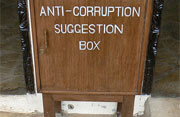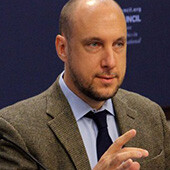Laurance, tell me about your background and experience in Africa.
I was born in Nairobi to a family of doctors, educators, and farmers living in Kenya, Tanzania, and Rwanda. As a third generation African and part of the last generation of empire, I was coming of age as Britain handed back its East African colonies to the indigenous people in the early 1960s. By the late 1960s, I was back in East Africa and responsible for the Financial Times' business there just as these countries were promoting themselves to attract foreign investment. But as I returned to Africa over the next 30 years, population growth, urbanization, corruption, development ideologies, and a continuous decline in the standard of living made Africa's challenges appear to be almost insurmountable.
You have mentioned corruption as one of the biggest challenges in Africa. Why is this the case?
The British invested heavily in East Africa—they built schools, hospitals, railways, roads, and bridges. Economically speaking they took a huge loss on these long-term investments, but from the 1970s forward colonial powers were seen as exploiters and their legacy was seen as the direct cause of Africa's post-independence problems. Away from all the political rhetoric about development, legitimate businesses were built up by Africans, foreigners (including ex-colonials), and the Asian community.
For over 40 years now, business has been sidelined from discussions of development in Africa. The terrain was occupied instead by rival geopolitical forces, well-meaning international development agencies, and non-governmental organizations for which the private sector was an alien phenomenon, at best irrelevant and at worst exploitive.
Given the rapidly changing geopolitical context, and with Germany chairing the G8, the Africa conversation is moving away from aid commitments and debt relief to investment, particularly for small- to medium-sized enterprises. This will focus investor attention on the more transparent economies in the region as multinational businesses now appear more inclined to address Africa's challenges as opportunities, viewing the continent through the lenses that China and India have used to their advantage.
The U.S. and European mindset is shifting from one based upon seeing Africa as simply a source of commodities and natural resources to one that harnesses talent and produces a real increase in the trade of manufactured goods. African governments, of course, will need to show good governance and transparency to compete for this coming tide of investment. Over the next five years, African economic development will become far more efficient and effective than the bilateral agencies, NGOs, and Northern government aid schemes have achieved up to this point.
What kind of effect does corruption have on the lives of the average person living in Africa?
It is very clear that giving aid to corrupt governments in Africa—or anywhere in the developing world—does more harm than good to the average person. The ruling elites bank the money abroad, very little trickles down to the poor, and a stabilizing middle class is prevented from being established. The facts show that over the past 42 years Western governments have poured $568 billion in aid donations into Africa. Yet there has been no increase in the standard of living for the average person in Africa.
What is the source of these problems?
I think it is important to avoid the trap of cultural relativism here. To assume that Africans are more corrupt than we are is a false, not to mention patronizing, premise. As William Easterly points out in the latest issue of Foreign Policy, development ideology, for the poor world, came to be defined as doing whatever the IMF and the World Bank told them to do. But with 25 percent of aid budgets consumed by "overhead" at home in the donor countries, the hiring of expensive consultants, and all players engaged in inordinate amounts of travel to "review" aid projects on the ground, the aid industry's own baksheesh is seen by many Africans as our own corruption dressed up in institutionalized Western garb.
The aid industry's sense of entitlement to make a living off the poor in the developing world is every bit as corrupt as the opacity in the "earmarking" process conducted in the dead of night by legislators here in the States. Although accountability exists in the U.S., it has yet to be adequately applied. In the aid business, accountability is close to nonexistent, and that costs the poor dearly.
Some say a certain amount of corruption is needed to lubricate the economy. Do you buy that argument?
Not at all. Wars are good for the arms manufacturers and outsourced military contractors; in the short term they also lubricate the economy. Should we condone a certain amount of war to keep the economy robust?
According to a recent World Bank report, African corruption is on the wane. Does this seem to ring true with your observations? To what can we attribute this success?
Yes, it does. Mind you there is a long way to go, but a significant start has been made. First, I think we have entered a new era in which Africans have figured out that they must deal with the issues of transparency and governance by themselves without interference from outsiders who think they know how best to transform their societies. The days of blaming the exploitation of colonial masters are over. Reliance on aid and bilateral assistance has not been very effective and with many African economies now growing at 6 percent they recognize the need to establish credit ratings to borrow from the mainstream debt markets and once again to attract foreign direct investment. Ten years ago only one sub-Saharan country had a credit rating. Today 20 countries are rated—in a move to start diversifying their sources of funding.
Take Nigeria for example. From independence in 1960 to 2003 no one had ever been convicted of corruption. This is in the largest African state with a population of 160 million, and it ranks near the bottom at 142 out of 163 by Transparency International.
Since April 2003, an extraordinarily brave individual, Mallam Nuhu Ribadu, the Executive Chairman of Nigeria's Economic and Financial Crimes Commission (EFCC), has succeeded in convicting 150 people of corruption and ensured restitution of $45 billion in stolen assets to their rightful owners. Meanwhile, his Kenyan counterpart John Githongo lives in exile in the U.K. because his own government cannot guarantee his safety.
With electoral problems and an enormous amount of oil money in play, Nigeria has a long way to go before it can seriously appeal to foreign investors beyond the extractive industries. But my point is that this first step in cleaning house was an African initiative instituted by the Nigerians in their own self interest. And it will be interesting to watch as Nigeria follows Ghana, Zambia, and perhaps even Kenya into the renewed sovereign debt market.
Who has been on the forefront of this issue? Which NGOs, businesses, and organizations are helping?
Africans are now helping themselves with leaders like Ellen Johnson-Sirleaf, president of Liberia and Africa's first elected female head of state, and businessmen like Mo Ibrahim, a Sudanese-born British mobile communications entrepreneur and founder of Celtel. Mo launched the Mo Ibrahim Prize for Achievement in African Leadership. At $5 million, plus $200,000 a year for life, the prize is the world's largest, exceeding the $1.3 million Nobel Peace Prize.
NGOs like the African Medical and Research Foundation have learned how to devolve management and implementation down to the local level. Founded in 1957, AMREF is the only international health development NGO that has its headquarters in Africa, and 97 percent of the staff is African.
Africans are benefiting from leap-frogging technologies—they have the fastest growing cell phone and ISP markets in the world. Moreover, they are harnessing the Internet with transparency initiatives like Mzalendo, a volunteer-run project whose mission is to "keep an eye on the Kenyan Parliament."
The winds of change that blew through Africa in the 1960s also brought us kleptocrats like Mobutu who were tolerated for the duration of the Cold War. Those winds also helped to establish an ideology of development, which patently has not worked.
Africans are now taking the future into their own hands. To succeed they are well aware that they must demonstrate the rule of law, good governance, transparency, and rapid adoption of new technologies, as well as earn their credit ratings and so move from the fringe of the financial system closer to the heart of the world economy.






